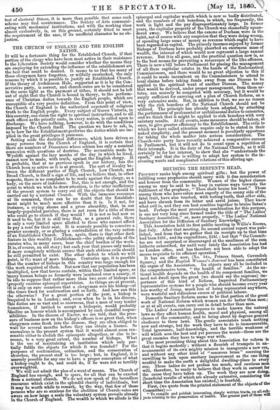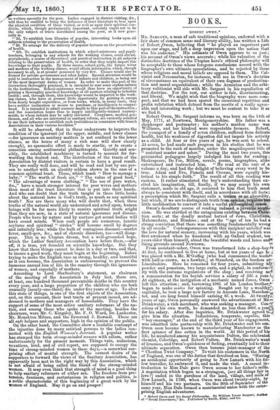BRUISING THE SERPENT'S HEAD.
Pilortiscr ranks high among spiritual gifts ; but the power of fulfilling some prophecies should carry with it due consideration and honour from the community. Women of the higher classes among us may be said to be busy in various ways towards the fulfilment of the prophecy, "Thou shalt bruise his head." Those among them who have eaten most eagerly of the sunny side of the fatal fruit, have also touched, with testing tooth, that other side, and have shrunk from its bitter and acrid juices. They knew what evil is, and they can best combine together to bruise Satan's head. Perhaps the most promising combination for this purpose, is one not very long since formed under the title of" The Ladies' Sanitary Association," or, more properly, "The Ladies' National Association for the Diffusion of Sanitary Knowledge."
This Association held its first public meeting in Willis's Rooms, last July. After that meeting, its second annual report was pub- lished, and from that we gather that its receipts up to that time had been 240/., and its expenditure, 2181.; but that "the Commit- tee are not surprised or discouraged at the smallness of the sum hitherto subscribed, for until very lately the Association has had no London office' and has therefore not been able to adopt the means requisite to its efficient operation."
It has an office now, (No. 14a, Princes Street, Cavendish Square,) and the English Woman's Journal has been constituted the organ of the Association. Its objects may all be included in the comprehensive term, "the health of families." As the na- tional health depends on the health of its component families, we need not dwell upon the great (we should say the supreme) im- portance of this kind of Reform. Improved Parliamentary representative systems for a people who should become every year less worthy of living, much less of being represented anywhere, were wasteful and ridiculous excess of political labour. Domestic Sanitary Reform seems to be that portion of the great work of National Reform which women can do better than men; or at at all events, can carry out in detail better than men. The Ladies' Association proposes to make known the natural laws as they affect human health, moral and physical, among all classes of the community; and to bring about by degrees general obedience to those laws. The gentle associators teach nothing new and strange, but the work they have to do is immeasurable. Total ignorance, half-knowledge, and the terrible weakness of will which sees the best and yet pursues the worst—these are the great enemies they have to wage war with. The most promising thing about this Association for reform is that it begins modestly ; without a flourish of trumpets in an- nouncement of its own mighty mission to inaugurate a new era, and without any other kind of "sonorous brass" coercing the unwilling to look upon sanitary improvement as the one thing needful to make the earth a delightful dwelling-place to every one. These ladies do not profess too much, and cautious men will, therefore, be ready to believe that they work in earnest for the cause they have taken up. The work they are now (beneficial results of which are already extensive, considering the short time the Association has existed,) is fourfold.
First, (we quote from the printed statement of the objects of the Committee) :— " To compile and publish interesting, simply written tracts, on all sub- jects relating to the preservation of health. The greater part of these will
specially for the poor. Ladies engaged in district visiting, &e., will thus be enabled to bring the influence of tract literature to bear upon the physical condition of those visited, as well as upon their spiritual con- dition, which, though preeminently important, certainly ought not to be the only subject of tracts distributed among the poor, as it now gene- rally. is. "2d, To establish loan libraries of popular, interesting books upon all subjects relating to the preservation of health. "3d. To arrange for the delivery of popular lectures on the preservation of health.
"4th. To establish institutions in which school-mistresses and pupil- teachers belonging to any schools for the working classes, could attend, gratuitoUsly, a course of theoretical and practical instruction in all subjects relating to the preservatien of health, in order that they might impart this knowledge to their pupils. By these means, school-girls, the future wives and mothers of the working classes, would obtain information which, though necessary to all, is at present possessed by very few. Classes would also be formed for private governesses and other ladies. Special attention would be paid to instruction in the management of infants and children, as being one of the most important duties of woman. In order to make this part of the instruction thoroughly practical, it is intended to rear some orphan infants in the institutions. School-mistresses would thus have an opportunity of gaining a thoroughly practical knowledge of all matters relating to infantile health; and through them, this knowledge would be imparted to the work- ing classes, who have at present little opportunity for gaining it, except from dearly bought experience, _or from books which, in many cases, they have neither inclination or means to purchase, or intelligence to compre- hend. It is intended to admit nursery-maids to this part of the instruction ; and the Association hopes thus to supply intelligently-trained nursery- maids, to whom infants may be safely intrusted. Clergymen, medical gen- tlemen, and all who are interested in sanitary reform, are earnestly solicited to use their influence to establish such institutions in connexion with branch Associations in their various localities."
It will be observed, that in these endeavours to improve the condition of the ignorant (of the upper, middle, and lower classes —for ignorance on sanitary matters is not confined to the lower classes, as the house of many a rich man will show clearly enough), no spasmodic effort is made to startle, or to create a sensation among sentimental philanthropists. Quietly and. sen- sibly, the established machinery is turned to account for for- warding the desired end. The distribution of the tracts of the Association by district visitors is certain to have a good result. They are really well done, and will be read and lent by one per- son to another with an alacrity seldom shown in the case of a common spiritual tract.. Those, which teach "How to manage a baby," " The worth of fresh air," " The value of good food," "The advantage of warm clothing," "The use of pure water, &e.," have a much stronger interest for poor wives and mothers than most of the tract literature that is put into their hands. And who can doubt that the truth taught in these little books about the natural laws is God's truth, as much as any spiritual truth ? Nor are there many who will doubt that, when these truths of the natural world are understood and acted upon, human beings will be far more likely to receive spiritual truth aright than they are now, in a state of natural ignorance and disease. People who have by nature and by nurture got sound bodies will have sound minds. When such people are numerous, lunatic asylums and spiritual " circles" will become small by degrees and infinitely less ; while the bulk of contagious diseases—scarlet fever, small-pox, &c., and of chronic disorders, too—will disap- pear. This is no Utopian dream, but a well-grounded hope, which the Ladies' Sanitary Association have before them,—afar off, it is true, yet founded on scientific knowledge. But they know that these things cannot be done in a day or two, and that, to insure a good work, they must begin at the beginning. Before trying to make the English race as strong, healthy, and beautiful as it can become, the Association is endeavouring to prevent the immense annual loss of life in the country through the ignorance of women and especially of mothers. According to Lord Shaftesbury's statement, as chairman of the meeting of the Association in July last, there are, at least, one hundred thousand preventable deaths in this country every year, and a large proportion of the children who are born annually (nearly-one-third) die under five years of age. To alter this state of things, is one of the first objects of the Association, and, on this account, their best tracts at present issued, are ad- dressed to mothers and managers of households. They have the support of some of the most active sanitary reformers of the na- tion, and among those who spoke at the meeting, besides the chairman were Mr. C. Kingsley, Mr. F. 0. Ward, Dr. Lankester, Mr. Monekton Milues, and the Reverend J. Rowsell. These are all safe helpers and supporters, high in the opinion of the public.
On the other hand, the Committee show a laudable contempt of the injustice done by many satirical persons to the ladies con- nected with the English Woman's Journal. A popular writer has stamped the term strong-minded woman with odium rather unfortunately for the present moment. Things vain, audacious, vexatious, loud, and of evil report, are supposed to occupy the time of strong-minded women in these days,—a somewhat sur- prising effect of mental strength. The earnest desire of its supporters to forward the views of the Sanitary Association, has apparently been met in the right way by this Association, which is not afraid of being called the friend of the strong-minded women. It may even think that strength of mind, is a good thing to help sanitary reformers of either sex. The freedom from pre- tension, fussiness, and sectarianism in religion and politics is a noble characteristic of this beginning of a great work by the women of England. May it go on and prosper !



























 Previous page
Previous page